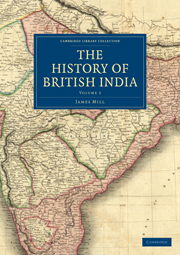Summary
While the principal station of the Company's power in India was giving birth to so many important transactions, their Presidency on the Coromandel coast was not barren of incidents entitled to a great share of our regard.
The relation, in which the Company professed to stand to the country, was different in Carnatic, and in Bengal. By the avowed possession of the duannee, they entered in Bengal into the direct discharge of the principal functions of internal government. In Carnatic, during the contest with the French, they had held up Mahomed Ali; upon the termination of it, they had acknowledged him, as the undoubted sovereign of the country. He was established, therefore, in the possession of both branches of power, both that of Nazim, or the military power, and that of Duan, or the financial power: and the Company held the station of dependents; possessing their privileges through his sufferance, and owing obedience to his throne. They possessed a grant of land, surrounding Madras, which had been obtained in 1750, and in 1762 confirmed by the Nabob of Carnatic or Arcot, in recompense of the services rendered by the Company to him and his family. This was a sort of estate in land, under what is called jaghire tenure, enabling the owner to draw the revenue, which would otherwise accrue to government; and to exercise all those powers which in India are usually connected with the power of raising the taxes.
- Type
- Chapter
- Information
- The History of British India , pp. 421 - 475Publisher: Cambridge University PressPrint publication year: 2010First published in: 1817



